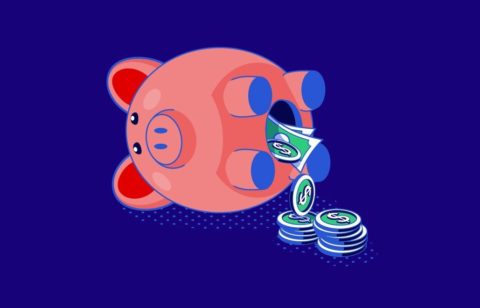
Debt consolidation isn’t for everyone.
Many individuals are able to change their lives for the better by consolidating their debt. They combine their monthly payments into a single easier-to-manage payment that often comes with a lower interest rate.
However, achieving that kind of success depends on many other factors. You need to find a lender that can offer a debt consolidation package that works for your financial situation. You need to understand the short- and long-term benefits of the consolidation process. Most of all, you need to refrain from running up new debts while paying off the current debt consolidation.
Before undergoing debt consolidation, it’s vital to understand the risks and if it is the best option for your financial situation.
Here are the top 5 reasons why debt consolidation might not work for you.
1. Even after consolidating, interest rates are still too high
It’s interest, not the principal amount owed, that makes debt so difficult to pay off.
Each month, interest compounds, increasing the amount of money you owe a creditor far beyond the initial sum borrowed. It doesn’t matter how much you owe or if you’re struggling to pay off the debt in the first place; interest keeps compounding until the debt is gone.
Debt consolidation often helps mitigate high-interest rates. In fact, many people seek consolidation less because they’re interested in reducing the amount of payments they make each month and more because they want to drive down their interest rates. By driving down interest rates, you can get out of debt faster and pay less overall to creditors.
While debt consolidation usually does offer an improvement in interest rates (especially compared to high-interest credit card debt), sometimes the reduction isn’t enough to make a meaningful difference.
Say, for example, you have a $20,000 debt on a 25% APR credit card with a minimum monthly payment of 2.5%.
For the monthly payment, you’ll pay a minimum of $500. However, only $83 of that payment actually goes to principal. The remainder, more than $416, goes toward paying down interest.
That’s a lot of money to pay each month, especially if you’re already struggling financially.
The best debt consolidation arrangements trim interest rates down to less than 10%. Ideally, you should hold out for an offer with an interest rate of 5% or lower. That way, the payments you make each month will go further toward actually eliminating the debt.
2. Even after consolidating, the monthly payments are still too high
If you are already struggling to make ends meet, the monthly payment reduction might not be enough. Running out of money is almost certain to drive you to start spending on credit, which will only make the debt problem worse.
Assuming you got the best debt consolidation package you could find, a few options exist to consider.
First, make a budget if you haven’t already. A budget can help you map out your finances, project future expenses, and make long-term plans.
Next, calculate your income-to-expense ratio. How much of your income goes to expenses? If that number is higher than 75%, you likely have a problem.
In that case, there are really only two options: spend less or earn more.
The budget should make it relatively simple to find opportunities to spend less. Cutting back on costs such as groceries and entertainment can yield real results every month and help you pay off that debt faster.
Earning more is tougher, but it can help you make ends meet without having to submit to strict financial discipline. Finding freelance work, taking on a second job, or asking for a promotion can all be game changers.
If that seems like a lot of work, consider the much worse alternative, which is falling behind on payments and facing harassment from debt collectors.
3. The repayment period is so long that it actually costs more money, in the end, to pay down the debt
It can be easy to agree to a repayment period that’s longer than is actually necessary. You might see that a longer repayment period comes with significantly lower monthly payments, which, based on your financial situation, makes you decide that you’d rather keep more money in your pocket each month.
That’s understandable, but it could also be a mistake. As a rule of thumb, the longer the repayment period is, the more you will pay on the debt in the end. The extra interest you pay over time vastly outweighs those lower monthly payments.
Ideally, you should seek a debt consolidation package with a repayment of five years or less. The monthly payments will get higher the shorter that period gets, but you’ll get out of debt much faster and save a ton of money in the end.
4. You end up taking on new debt and undermining progress
Many people struggle to resist the temptation of spending on credit. Often, when you’re struggling financially, it’s hard to see any other option to make ends meet other than offloading a portion of your expenses onto a credit card.
Regardless, if you’re accustomed to spending on credit, then debt consolidation can be a very dangerous thing.
Say you have five maxed-out credit cards that add up to about $15,000 in debt. You manage to consolidate that $15,000 into a single monthly payment that works better for your financial situation.
What happens to the credit balances? They all drop to zero overnight, freeing up an enormous amount of credit all at once that you’re free to use. If you’re accustomed to spending on credit, it’s going to be very difficult to not run up those cards again, even if doing so undermines what you’re trying to accomplish by consolidating the debt in the first place.
There are plenty of strategies out there designed to help you resist the temptation to use credit cards. Some people suggest freezing credit cards in a bowl of ice. When you want to make a purchase on credit, you have to wait for the ice to melt, giving you plenty of time to reflect on what you’re about to do.
More realistically, some experts suggest that those with poor self-control give their credit cards to a trusted friend or family member. Each time you want to use the cards, you’ll have to plead your case to someone who has your best interests in mind.
Regardless of how you do it, the advice is simple: if it’s possible to avoid taking on more debt, do so.
5. You undergo a serious life change, making the debt consolidation arrangement impossible to maintain
Change occurs when we least expect it, upending our lives and disrupting our plans. Debt consolidation is not immune to this kind of disruption. If there’s a serious change to your life or financial situation, it can throw well-intentioned plans for paying down debts into total disarray.
Medical emergencies are often the culprit here. Perhaps you suffered an injury or became ill. Medical bills will pile up, regardless of your ability to pay them.The debt consolidation plan that seemed so wise before becomes an enormous burden as a result.
Fortunately, you have options.
First, you should revisit your budget to find opportunities to save more money and keep up with bills.
If that’s not possible, many lenders are open to discussing forbearances in these types of situations. Forbearance is a pause in repayment that allows you to get back on your feet. Generally, a lender would rather work with you in the present to ensure it receives payment in the future rather than continuously harass you for the money you don’t have.
Seeking a reconsolidation is also an option here. You might be able to find even lower rates by consolidating your debt again with a different lender. If you go to a credit counselor, you may also get advice and assistance in managing finances responsibly.
It’s important to understand that debt consolidation is not the simple, overnight solution that many people think it is. It requires discipline and patience to work well. If you can avoid the pitfalls discussed above, you stand a good chance of making the most of the consolidation experience.





